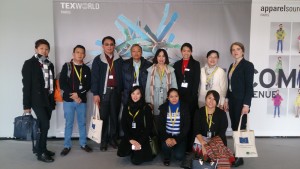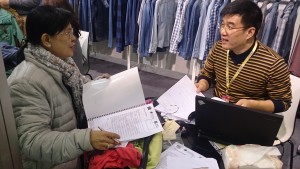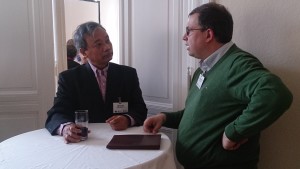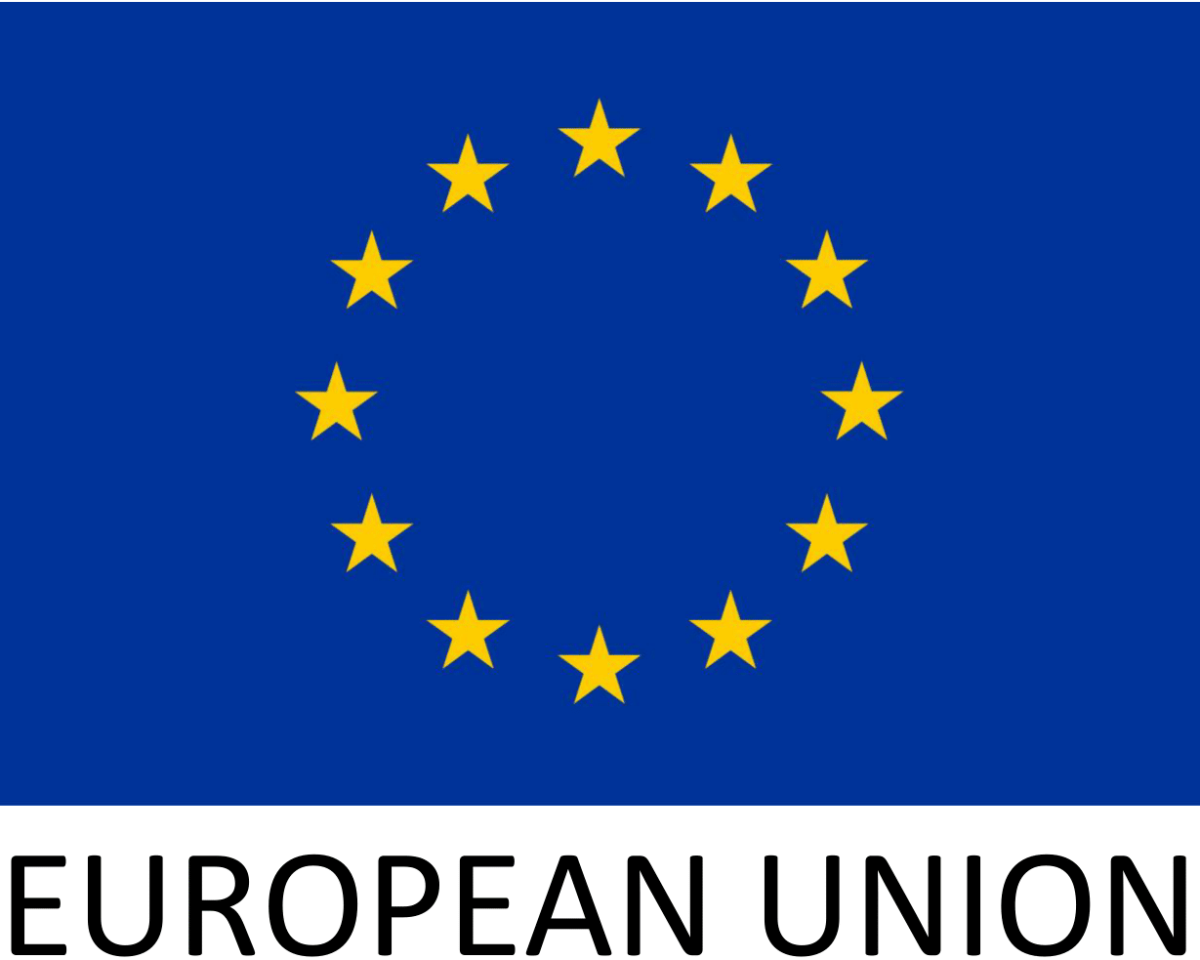 Nine top representatives of Myanmar garment factories participated in a delegation to Paris and Berlin from February 8 to 18, 2015, in order to get a better understanding of European Markets and European buyers’ requirements. This mission was organized by SMART Myanmar and implemented by sequa in Europe. The participants for the mission were carefully preselected through a process of cooperation with a bigger group of Myanmar garment factories. Based on their interest to export to Europe, to improve working conditions in their own factories and the progress they made by implementing changes, the best factories were selected by SMART Myanmar. This mission is part of a set of activities all relating directly to improve market access for Myanmar garment factories to EU markets.
Nine top representatives of Myanmar garment factories participated in a delegation to Paris and Berlin from February 8 to 18, 2015, in order to get a better understanding of European Markets and European buyers’ requirements. This mission was organized by SMART Myanmar and implemented by sequa in Europe. The participants for the mission were carefully preselected through a process of cooperation with a bigger group of Myanmar garment factories. Based on their interest to export to Europe, to improve working conditions in their own factories and the progress they made by implementing changes, the best factories were selected by SMART Myanmar. This mission is part of a set of activities all relating directly to improve market access for Myanmar garment factories to EU markets.
The participants were able to gain insights into the multilayered European textile market by visiting two major garment and textile trade shows located in Paris and Berlin. The trade fairs gave them the chance to establish new business contacts as suppliers and to practice dialogue with Asian and European partners. At the same time, visiting the fairs provided the participants with highly needed sourcing knowledge as a high number of Asian exhibitors was present with their products (fabrics and accessories). The Myanmar garment manufacturers wish to add more value to their garment production by moving from the so calles Cut Make Pack (CMP) business model to the higher margin Free On Board (FOB) production which is full scale business. Through a systematic analysis of European shops, ranging from low level to high level price range, the entrepreneurs extended their knowledge on some characteristics of the European market conditions, such as final prices, European quality standards and the scope of demand. A key event of the trip was an intensive dialogue with German buyers during a B2B meeting that sequa organized jointly with German fashion Confederation and the Confederation of the German Fashion and Textile Industry.
In Paris, the main points on the agenda were shop and product analysis as well as the visit of one of the world’s major trade fairs in the textile sector, Tex World. Giovanni Beatrice, Dutch garment expert from CBI (Center for the promotion of Imports from developing countries, an agency of the Dutch Ministry of Foreign Affairs), held an introductory session where he provided the group with a tool for shop and product analysis as well as a tool for efficient price enquiries regarding suppliers. Beatrice advised the participants during their assignments in Paris.
 During their visit of TexWorld, the company representatives had the chance to speak both to buyers and to suppliers. In their talks, the participants were guided by staff from sequa, SMART Myanmar’s project lead organization, as well as Giovanni Beatrice. “sequa staff, helped me a lot in asking suppliers the right questions”, Khy Khy Nwe, Director of Thiri Sandar, said. During the analysis sessions about the garment products being sold in Paris shops, participants had questionnaires which helped them elaborate a profile of each shop, along the lines “products, price range, quality requirements and compliance requirements”. Preparing such a shop profile is a good basis to identify brands to which a company can supply products. Companies visited and analyzed more than 30 shops in Paris.
During their visit of TexWorld, the company representatives had the chance to speak both to buyers and to suppliers. In their talks, the participants were guided by staff from sequa, SMART Myanmar’s project lead organization, as well as Giovanni Beatrice. “sequa staff, helped me a lot in asking suppliers the right questions”, Khy Khy Nwe, Director of Thiri Sandar, said. During the analysis sessions about the garment products being sold in Paris shops, participants had questionnaires which helped them elaborate a profile of each shop, along the lines “products, price range, quality requirements and compliance requirements”. Preparing such a shop profile is a good basis to identify brands to which a company can supply products. Companies visited and analyzed more than 30 shops in Paris.
The companies also benefited from presentations organized by Messe Frankfurt, Tex World’s hosting organization. Amongst others, Texworld’s Art Director Louis Guérin spoke about Designer requirements regarding supplier companies. Michael Jaenecke, Director Brand Management Technical Textiles and Textile Processing of Messe Frankfurt introduced the participants to the Texprocess fair. Jean-Francois Limantour, head of EVAlliance, an association fostering better trade relations between Asia and Europe, highlighted the need for a trade agreement between Myanmar and the European Union.
The participants also visited ESMOD fashion school and are planning further talks in view of EMOD’s plans to opening of an ESMOD branch in Yangon.
In Berlin, the participants visited the trade fair Asia Apparel. Here, they received a good overview about their competitors from China, Bangladesh and other Asian countries. Again, sequa staff was present to assist with the talks if needed.
The companies also met with SMART Myanmar’s project Director, Simone Lehmann in order to continue work on the Code of conduct of Myanmar garment factories. For this workshop two international CSR experts, the Systain consultants Thorben Kehne and Jens Winkler were invited. On the basis of the SMART Compliance Academy, which SMART Myanmar conducted together with Systain in September 2014 in Myanmar, the delegation participants planned further steps to make the whole industry comply with the Myanmar Garment Manufactores Association (MGMA) Code of Conduct – a standard the Myanmar gave itself to improve the working conditions in the garment factories. The companies indicated the need for sharing knowledge concerning CSR and requested monthly on site monitoring of the changes initiated by the SMART compliance academy in order to keep the momentum for changes up and running. Corrective action plans regarding CSR were welcomed by the participants. In order to ensure sustainability of CSR knowledge, board members of the MGMA decided that MGMA will hire full time staff to create a CSR department. Also, an extensive CSR awareness raising campaign was planned by the participants with the aim to promote the acceptance of the Code of conduct among MGMA members. It was pointed out by MGMA chairman Myint Soe that the CSR issue is crucial not only because buyers want to see compliance with CSR standards, especially European buyers. But also because better working conditions make factory workers more motivated and satisfied which results in better factory productivity. The Code of Conduct therefore shall be translated in Burmese and bilingual posters shall be displayed in all factories. A two way communication concerning the code shall be set up, both to buyers and manufacturers. To link up with the new EU flagship initiative Sustainable Garment and Textile Sector a round table discussion about the MGMA Code of Conduct with all relevant stakeholders in Myanmar was planned. During this dialogue to be held in March 2015, the EU Delegation of Myanmar will host an event to foster national dialogue between ILO, Ministries, MGMA and international brands like H&M and Esprit. Further awareness raising events shall take place during this same week, like a networking event at a model garment factory. Last but not least, an action plan was elaborated by the participants. Activities include a Compliance Achievement award and the training for Ministry of Labor inspectors in Myanmar.
 Like in Paris, product as well as shop analyses were conducted in Berlin. Participants compared shops ranging from C&A to Louis Vuitton, had a look at alternative shop concepts like TK maxx and compiled shop profiles regarding price range, quality standard and compliance requirements. A crucial event during the trip in Germany was the meeting of several German companies during a buyer’s meeting, organized jointly by sequa and German Fashion Confederation. Work wear producers were present as well as toddler’s garments, sportswear and ladies wear. After a brief introduction to the developpp-Program, a program funded by the German Ministry of Economic Cooperation to support private companies’ activities in developing countries, Myanmar companies presented themselves with their company profiles developed in the training of the SMART Myanmar project. The participants had the opportunity to hold informal talks over coffee and cake while sequa staff ensured that all companies spoke to each other. “An efficient and professionally organized meeting, I am very much looking forward to obtaining further samples and price information from the companies I spoke to”, a representative of a German company present at the meeting told. Like her, the other German company representatives were very positively surprised with the quality of the samples and pointed out that responsible production really was an issue which they needed and wanted to attend to and saw that there are good preconditions for this in Myanmar.
Like in Paris, product as well as shop analyses were conducted in Berlin. Participants compared shops ranging from C&A to Louis Vuitton, had a look at alternative shop concepts like TK maxx and compiled shop profiles regarding price range, quality standard and compliance requirements. A crucial event during the trip in Germany was the meeting of several German companies during a buyer’s meeting, organized jointly by sequa and German Fashion Confederation. Work wear producers were present as well as toddler’s garments, sportswear and ladies wear. After a brief introduction to the developpp-Program, a program funded by the German Ministry of Economic Cooperation to support private companies’ activities in developing countries, Myanmar companies presented themselves with their company profiles developed in the training of the SMART Myanmar project. The participants had the opportunity to hold informal talks over coffee and cake while sequa staff ensured that all companies spoke to each other. “An efficient and professionally organized meeting, I am very much looking forward to obtaining further samples and price information from the companies I spoke to”, a representative of a German company present at the meeting told. Like her, the other German company representatives were very positively surprised with the quality of the samples and pointed out that responsible production really was an issue which they needed and wanted to attend to and saw that there are good preconditions for this in Myanmar.
Both in Paris and Berlin, it emerged that Myanmar companies have a good reputation and that buyer companies start considering Myanmar as an alternative to classical production countries like China and Bangladesh. Myanmar is not only offering comparably cheap labor, but has also made considerable progress in its reforms of relevant laws that set conditions for doing business in Myanmar. The government of Mynanmar has furthermore developed a national garment export strategy and explicitly expresses its determination to do business in a sustainable manner. Myanmar companies need to take up this opportunity and will be supported in their efforts by the SMART Myanmar project. In March 2015, for example, organized jointly with Confederation of the German Fashion and Textile Industry and SMART Myanmar local team, around 20 Swedish, Danish, German and British companies in the garment trade will visit Myanmar to visit manufacturing plants and get a better understanding of Myanmar companies’ potential.










